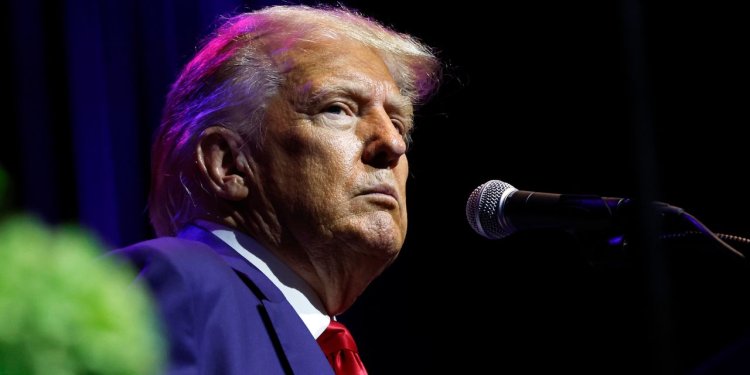Trump Turned the GOP Into the Party of Wishful Thinking
Its leaders assumed he was a joke, tried to make peace with him, and reckoned he was finished after 2020. By Gerard Baker Aug. 7, 2023 3:57 pm ET Donald Trump speaks at an event in Montgomery, Ala., Aug. 4. Photo: Butch Dill/Associated Press For a political class that likes to think of itself as a hardened cadre of cold-eyed realists, the leadership of the Republican Party has indulged in comically wishful thinking about the most consequential figure in recent political history. When Donald Trump emerged on the political stage to lead his improbable insurgency of the dispossessed, most top Republicans assumed he was a joke and could never win. The party’s senators, who wouldn’t recognize an insurgency if it were presented to their nether region


Donald Trump speaks at an event in Montgomery, Ala., Aug. 4.
Photo: Butch Dill/Associated Press
For a political class that likes to think of itself as a hardened cadre of cold-eyed realists, the leadership of the Republican Party has indulged in comically wishful thinking about the most consequential figure in recent political history.
When Donald Trump emerged on the political stage to lead his improbable insurgency of the dispossessed, most top Republicans assumed he was a joke and could never win. The party’s senators, who wouldn’t recognize an insurgency if it were presented to their nether regions on the sharp end of a pitchfork, with one exception dismissed him as a carnival barker.
When the iron duly entered their hides—if not their souls—they hurriedly made their peace with their new leader. When, against the odds (and, one suspects, the wishes of more than a few of them), he won the presidency, the wishing only intensified. Some believed, or hoped, that somehow the office would become him, that the mystical mingling of the man and the presidency would elevate the former rather than debase the latter. How did that work out?
Some allowed the wish to father the thought that by working with and for him, they could restrain his flammable impulses. The long list of short-lived ex-Trump cabinet officers is eloquent testimony to the fancifulness of that idea.
More realistically, many hoped that his energy and charisma could be harnessed to the pursuit of the party’s long-running objectives. Some of their wishes were indeed fulfilled: a solid legislative record, three fine Supreme Court justices, a robust economic performance.
But when he violated his oath of office after the 2020 election by attempting to overthrow the constitutional order, Republicans faced their worst choice yet between fact- and faith-based decision making: Bite the bullet and banish him from office, or keep wishing, harder than ever.
It wasn’t really a contest. With a few exceptions, they declined to vote to impeach or convict him in January and February 2021, many clinging to the misplaced belief that he was finished anyway. They read his approval numbers—Gallup had him at 34% at the end of his presidency—and assumed his ego wouldn’t allow him to launch another presidential bid that was surely doomed from the start.
So they have spent 2½ years crossing their fingers and gripping their talismans, despite a solid and immovable wall of evidence that Mr. Trump was going to run again and was a heavy favorite for his party’s nomination. With one or two exceptions, his dozen or so Republican opponents continue to hope for a miracle rather than to do the hard work of trying to engineer one.
The wish-inspired decision making was, as it always is, a substitute for honest, difficult decision making. Few Republicans have wanted to risk the wrath of Mr. Trump’s passionate supporters, but at the same time many were always much more appalled than they let on at the thought of the man behind Jan. 6 leading their party into the next election.
Mr. Trump’s latest indictment last week, on charges relating to his attempt to overturn the 2020 election, signals that the long era of wishful thinking in the Republican Party leadership’s relationship with Mr. Trump must come to an end.
Not that everyone has recognized it. I suspect that even now a significant number of senior party figures, even as they express public outrage at the judicial tyranny on show in the charge sheet and dubious legal theories of special counsel Jack Smith, are secretly, desperately hoping that somehow this case will spare them from having to keep on side with the former president. They’re telling themselves that some new revelations at trial or even the possibility of a prison sentence will persuade enough Republican primary voters to withdraw their support and that this chalice will pass their lips. Their wishes might finally come true, but I doubt it.
Read More Free Expression
- How to Think About ‘Bidenomics’ July 17, 2023
- Don’t Blame Liberalism for Illiberal Progressives July 10, 2023
- The Supreme Court Declares Independence July 3, 2023
The larger problem the latest charges represent isn’t simply that they probably cement Mr. Trump’s standing in the primary. It is that they present Republicans with a decision that has dramatic consequences for the rule of law.
I don’t know if Mr. Trump is guilty—and I certainly don’t dispute that the Biden administration is pushing the bounds of prudent and proper law enforcement in a way that threatens stable government. It would be wishful thinking on my own part to hope that in the best interests of the republic and justice, a jury might carefully weigh the case and acquit him.
But after this Republicans must understand there is no turning back in the war between Mr. Trump and the Democrats on the battlefield of so-called justice—one he will prosecute with gusto if he is elected. There will be those who say that this is the inevitable path the party must take—a ruinous course, in my view. But Republican leaders should stop pretending they don’t know the consequences and decide whether they want to follow this perilous path.
Journal Editorial Report: The Department of Justice accelerates its legal offensive. Images: Zuma Press/AFP/Getty Images Composite: Mark Kelly The Wall Street Journal Interactive Edition
What's Your Reaction?

















